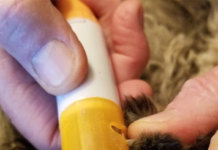Stress as a Cause of Excessive Grooming
Kitties are known to be fastidious groomers but be careful not to confuse psychogenic alopecia (hair loss) with normal feline grooming. Psychogenic alopecia (PA)...
Get the Most Out of Eye Ointments
Bottles of eye drops and tubes of eye ointment are generally small because you don’t need much of these medications and having leftover...
Can Music Relax the Savage Cat?
Feline friendly practices are always looking for ways to make their patients happier and calmer, as minimizing stress makes for a better veterinary experience...
2019 Top Pet Poisons
From the ASPCA Pet Poison Control Hotline, the most pet poisonings were due to:
Over-the-Counter Human Medications. These products account for 20% of the...
Two New Flea-Control Drugs
Two flea control products recently received FDA approval for use in cats 8 weeks of age and older. Both require a prescription from your...
Grinding Your Cat’s Nails
Nail care should be a part of your cat’s routine health maintenance. Many cats wear their nails down on their own, but others can...
Avoid Getting Your Dander Up
Your cat is kneading in your lap and you notice some dry flakes. Then she rolls over and you realize how little hair there...
Measuring Chronic Stress in Cats
Researchers at Colorado State University and Western University in Ontario, Canada, set out to find a way to measure feline cortisol levels over time...
Pets and Spousal Loss
A study from Florida State University shows, again, how important our pets are to us. Published in The Gerontologist, the study examined depressive symptoms...
Life Without Teeth
When a person loses all their teeth, major lifestyle changes, such as dentures and diet adjustments, are usually necessary. Luckily, cats adapt more easily....
The Ins and Outs of Catios
All cat lovers understand the perils of letting a cat run outside: traffic, wild animals, other domestic animals, unscrupulous people, and disease. But we...
Tick Identification Service Available
In an effort to identify the tick species in pets across the United States, the National Center for Veterinary Parasitology (NCVP) at Oklahoma State University is offering a free tick identification service.

















